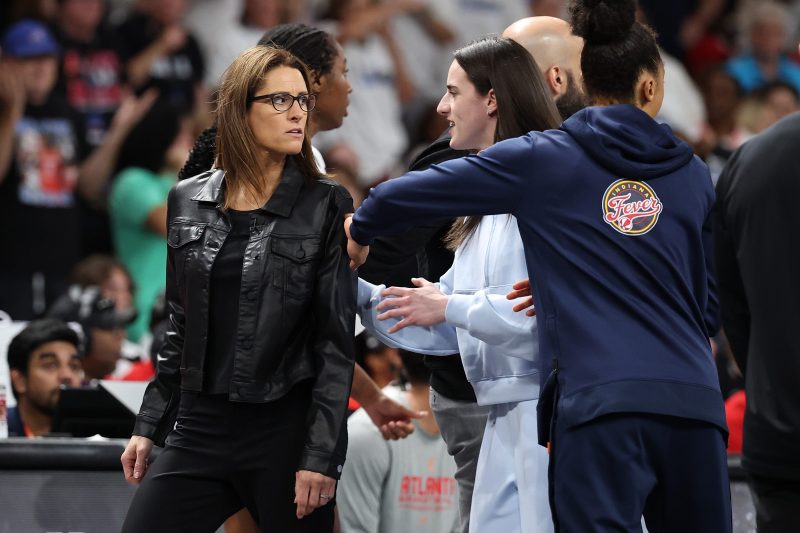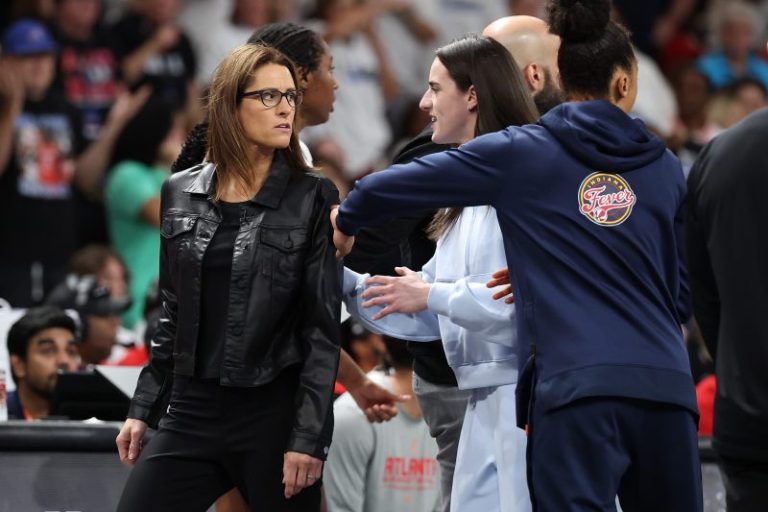
ATLANTA ― Inconsistent officiating is something that’s plagued the WNBA all season long, and it reared its ugly head again when the Indiana Fever played the Atlanta Dream in their opening round matchup of the 2025 WNBA playoffs.
Less than two minutes into the game, the first of 43 personal fouls was tallied, an ominous foreboding of the day that lay ahead. Whistle after whistle peppered the atmosphere in Gateway Center Arena, quickly taking the air out of the building and stifling any momentum. Coaches and players from both teams stood in bewilderment as each call was logged, hands on top of their heads in shock and mouths gaping open.“It’s very frustrating, very frustrating,” Fever head coach Stephanie White said postgame, calling out the officiating after the Fever’s 80-68 loss. “Nobody likes to use their challenges in the first half, especially when they’re successful, you know? And look, it is what it is. This is not anything that’s new.’
However, on Sunday, it wasn’t just the sound of whistles cutting through the crowd noise and arena music. It was the apparent lack of calls, too, which were eerily deafening. The seemingly subpar officiating caused tensions to boil over. The groans from the crowd, a healthy mix of Dream and Fever fans, got louder and louder with each missed call. Eventually, emotions boiled over.
Fever center Aliyah Boston picked up two fouls within six seconds in the fourth quarter, and moments later, White lost her cool over what she felt was a foul that should have been called. She unleashed on the officiating crew, earning her a technical foul during a seconds-long tirade. White had to be held back and coaxed to the bench by a gaggle of Fever players, including guard Caitlin Clark.
Still, White wasn’t the only coach to ask for better officiating across the league.
‘I want a fair fight. I really do,’ Nakase said. ‘I want a clean fight, but I love the fact that both teams are playing their hearts out. They’re fighting. But I would like it to be fair. … And for me, that’s why I got a [technical foul] because at what point is it going to be fair?’
However, Nakase wasn’t done there. She maintained that her team did not get the whistle they deserved, insinuating instead that it was Minnesota who was getting the calls. The Lynx ended Sunday’s matchup with 24 free throw attempts against the Valkyries’ 27. Although those numbers are a departure from the regular-season averages for each team (16.1 and 18.4 attempts per game, respectively), the first-year head coach appeared to be flustered by Minnesota’s calls.
‘We’re playing the best team in the league,’ she said. ‘They don’t need no help. This team is great. They’re stacked. They play well. They play beautiful basketball. They’re coached well. They don’t need the help.’
When there’s a championship on the line, coaches want the calls to be even on both sides and perhaps more consistent. However, it’s hard to imagine a world where officiating won’t impact the playoffs moving forward considering it happened on the grandest stage last season: Game 5 of the 2024 WNBA Finals.
Officials missed a travel by the Liberty on the final possession of regulation, instead calling a foul on the Lynx. The call had a visible impact on the game, eventually sending the matchup into overtime. The lobbying for better officiating has only intensified since that moment and the WNBA is aware. In July, league commissioner Cathy Engelbert addressed officiating in a state-of-the-league news conference at All-Star weekend. ‘We hear the concerns, we take that input, and every play is reviewed,’ Engelbert said.
‘We spend hours and hours on hours. Obviously, we then use that to follow up with officials’ training. Obviously, consistency is important. … I realize consistency is the name of the game, so I think it’s something we definitely look at and evaluate.”
After the playoff’s opening day, it would seem improvement cannot come quickly enough.

